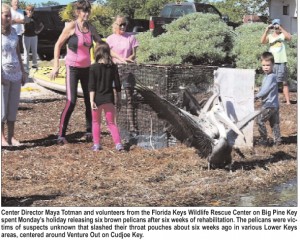Rescued pelicans released
By Steve Estes Local law enforcement officials and animal rescue personnel say that the rash of mutilated brown pelicans that were recently found in the Lower Keys seems to have come to an end.
Local law enforcement officials and animal rescue personnel say that the rash of mutilated brown pelicans that were recently found in the Lower Keys seems to have come to an end.
And investigators are no closer to solving the string of abuse crimes.
“I’m just glad it’s stopped,” said Maya Totman, director of the non-profit Florida Keys Wildlife Rescue Center on Big Pine Key.
Totman and her volunteers were involved in more than a dozen rescue attempts of brown pelicans over the span of a few weeks, but weren’t able to get to all the skittish birds they were tipped off to by angered and concerned folks.
Totman said she was alerted to the situation by long-time local charter boat Captain Jim Sharpe Sr. who found an injured pelican while on a run a abut six weeks ago.
When Sharpe and his crew were able to reach the bird, he discovered that its throat pouch had been slit cleanly.
US Fish and Wildlife Service Officer Steve Berger said at the time that the wounds were obviously caused by some human-manufactured instrument, and probably wielded by human hands.
Berger said this isn’t the first time they have found pelicans apparently mutilated by humans.
“These birds do tend to anger people who are unfamiliar with them as they dive on your catch or invade your fishing spot,” said Berger.
But the reality is that the pelican is simply trying to get a meal just like any other living creature, he said.
Totman transported the pelicans she and her volunteers could corral to Dr. Dan Harris, a Miami veterenarian who stitched up the birds and returned them to Totman and her crew for rehabilitation.
She said the center spent about six weeks on the rehabilitation efforts on six birds they were able to save over the three-week stretch, releasing those pelicans back into the wild Monday.
She said that even though she and her volunteers learned of more than a dozen injured birds during the mutilation spree, they weren’t able to save them all.
“And that doesn’t count the ones that were reported to us that we couldn’t find later, or the ones we saw that we couldn’t capture,” said Totman.
She said that the mutilations involved someone or someones who would slice the bird’s throat pouches from breathing airway to beak, virtually eliminating the pelican’s ability to eat.
Pelicans capture fish in their elongated beaks and then toss the fish into their throat pouch prior to tossing the fish down their throat from the pouch.
“With the pouch cut, the fish just fell through the hole and was lost to the bird,” said Berger.
Totman said that essentially, the birds were starving to death if the injuries didn’t kill them.
At one point the brown pelican was included on the federal endangered species list, but has been downlisted to threatened after several years of tight protections.
Totman said that investigators haven’t given up on seeking the person(s) responsible for the mutilations,but as time goes by and no more injured birds appear, the chance of closing the case gets slimmer.
Totman and her volunteers run the rescue operation on a shoestring budget, and having an extra six hungry pelicans at the center for six weeks put a dent in the facility’s budget for the first part of the year.
“Our fish bill went very high to feed the injured birds,”said Totman.
But the cost doesn’t dissuade her crew from responding to injured bird calls.
“It matters not the bird or the time or the place,” said Totman.
She urges anyone who sees injured birds to give the facility a call at 305-872-1982 or 305-304-5326. The rescue center is located on Wilder Road on Big Pine Key.














